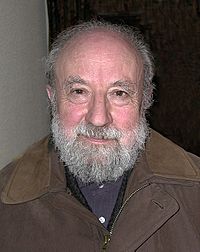Michel Butor facts for kids
Quick facts for kids
Michel Butor
|
|
|---|---|

Michel Butor in 2002
|
|
| Born | Michel Marie François Butor 14 September 1926 Mons-en-Barœul, Nord, France |
| Died | 24 August 2016 (aged 89) Contamine-sur-Arve, France |
| Occupation | Writer |
| Alma mater | University of Paris |
| Genre |
|
| Notable works | L'Emploi du temps La Modification Mobile |
Michel Butor (born September 14, 1926 – died August 24, 2016) was a famous French writer. He was a poet, novelist, teacher, and art critic. He also translated books from other languages.
About Michel Butor
Michel Marie François Butor was born in Mons-en-Barœul, France. This town is near Lille. He was the third of seven children in his family. His father, Émile Butor, worked as a railroad inspector. His mother was Anna Brajeux.
Michel Butor studied philosophy at the University of Paris. He finished his studies in 1947. After that, he traveled and taught in many different places. He taught in Egypt, England (Manchester), Greece (Thessaloniki), the United States, and Switzerland (Geneva).
He won many important awards for his writing. These include the Prix Fénéon and the Prix Renaudot.
His Unique Writing Style
Michel Butor was known for his experimental writing. This means he liked to try new ways of telling stories. Some people linked his novels to a style called "nouveau roman," or "new novel." This style often focused on objects and detailed descriptions. Butor himself felt his work was different.
One of his most famous novels is La Modification. It is written entirely in the second person. This means the story uses "you" instead of "he" or "she." It's like the book is talking directly to the reader.
For many years, Butor explored different types of writing. He wrote essays, which are short pieces about a topic. He also wrote poetry. He even created "artist's books." These are special books made in collaboration with artists. They combine text and art.
Butor loved literature, painting, and travel. His writing often mixed careful structures with beautiful, poetic language. He could be very precise, like an architect planning a building. But he also wrote with a lot of feeling, like a poet.
Working with Others
Michel Butor enjoyed working with other creative people. He collaborated with artists like Gérard Serée on his artist's books.
The famous American poet John Ashbery once said he wanted to sit next to Michel Butor at a dinner. This shows how respected Butor was by other writers.
In 1977, Butor met Elinor S. Miller. She was a French professor at Rollins College. They became good friends and worked together. They translated books, created catalogs, and gave lectures. In 2002, Miller wrote a book about Butor. It was called Prisms and Rainbows: Michel Butor's Collaborations with Jacques Monory, Jiri Kolar, and Pierre Alechinsky.
Awards and Honors
Michel Butor received many awards for his literary work. Here are some of them:
- 1956: Prix Fénéon, for his book L'Emploi du temps
- 1957: Prix Renaudot, for his novel La Modification
- 1960: Grand prix de la Critique littéraire, for Répertoire I
- 1998: Grand prix du romantisme Chateaubriand, for Improvisations sur Balzac
- 2006: Prix Mallarmé, for his poetry collection Seize lustres
- 2007: SACEM Grand prix des poètes
- 2013: Grand prix de littérature de l'Académie française, for all his writings
- 2016: Grand prix de poésie de la SGDL, for Ruines d'avenir : un livre tapisserie
See also
 In Spanish: Michel Butor para niños
In Spanish: Michel Butor para niños
 | William M. Jackson |
 | Juan E. Gilbert |
 | Neil deGrasse Tyson |

